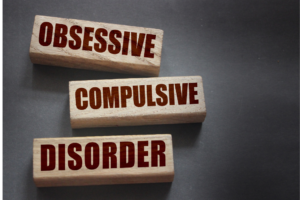Obsessive Compulsive Disorder: Part 1
A note from Joanna
 You are driving to work, and an ad for a smoke detector comes on the radio. “Oh no,” you think, “did I remember to turn off the stove after I made my scrambled egg this morning?”
You are driving to work, and an ad for a smoke detector comes on the radio. “Oh no,” you think, “did I remember to turn off the stove after I made my scrambled egg this morning?”
You stop for gas, and before grabbing the pump, a thought suddenly pops into your head: “I wonder how often someone wipes this thing down?”
Later, you are sitting in a meeting and have the urge to get up and yell obscenities at your boss.
These are examples of intrusive thoughts. Everyone has them at least occasionally, and if we’re honest, some of our intrusive thoughts can be pretty outrageous.
For most of us, these “throwaway” thoughts float by like a leaf on a river. Our brain either knows how to discard them (we don’t actually intend to get up and yell at the boss), or how to cope with them (we mentally rehearse our morning and remember that we did, in fact, turn off the stove, or we have hand sanitizer in the car to cope with the dirty things we sometimes have to touch).
This is life – we are forgetful, we have to touch dirty things, and sometimes our brains play tricks on us.
Most of us are pretty comfortable with these realities.
But for the approximately 2.5 million Americans who suffer from Obsessive Compulsive Disorder, or OCD, these ordinary bumps in the road become debilitating roadblocks.
When a person has OCD, they often develop compulsions — repetitive and forced behaviors — as a way to cope with intrusive and disturbing thoughts. Their brains will just not let go of troublesome thoughts, so it must create elaborate routines, rituals and behaviors in an effort to relieve the anxiety they cause.
The fear of not turning off the stove forces a person to compulsively turn back and double check, sometimes two or three times, causing them to be late for work or exasperate their passengers.
The concern about the dirty handle involves finding a way to either avoid putting gas in the car (great if there’s someone available to help, but totally inconvenient to always depend on another person), or wearing gloves every time there’s a need to fill up.
As for the urge to cry out at a meeting — a person with OCD may chide themselves for being disrespectful and wonder how on earth they could be such a terrible person. In response, they might develop a behavior such as an elaborate ritual for leaving work that they believe will help them keep from blurting out unwanted things.
These are fairly mild examples — often, obsessive thoughts are often extremely disturbing or disruptive, and compulsions can be time-consuming and embarrassing. (I have worked with more than a few clients who have been quite traumatized by the content of their intrusive thoughts or completely debilitated by their compulsions.)
OCD is Misunderstood & it’s Not Just Anxiety
More than likely you have heard of OCD — you’ve seen it portrayed in movies and television (As Good as it Gets, Monk) or have heard of a celebrity who suffers from it (Howie Mandel is one).
But even though OCD is a familiar term to many, it is often greatly misunderstood. For example, I have heard people say they wish they had OCD so they could be more organized or orderly.
People also tend to think of OCD as only excessive or repetitive behavior, such as hand washing or obsessive counting.
While some people who have OCD are obsessed with orderliness or cleanliness, and compulsions can include excessive hand-washing or counting, it is far more than this.
Often, their fears are related to something very unlikely or not consistent with their behavior. For example, a mother might be worried she hurt her children even though there is no evidence and no one else is concerned about this. Someone might fear they will contract a rare tropical disease even though they have never traveled to the country or come into contact with anyone who has.
And while many individuals with OCD experience sometimes debilitating anxiety, the presentation is atypical, and OCD is not technically considered an anxiety disorder. In the DSM-V (2013) it was given its own category: Obsessive-Compulsive and Related Conditions. This includes OCD as well as other conditions like body dysmorphic disorder, hoarding disorder, and trichotillomania (hair-pulling).
In order to find appropriate treatments, it is important to distinguish “typical” anxiety symptoms from the anxiety associated with OCD. The medications and therapies used to treat OCD are related but somewhat different than what is used in anxiety conditions. Additionally, an accurate diagnosis can prevent unnecessary treatments, such as inpatient hospitalization.
I once worked with a young woman who had obsessive/intrusive thoughts of suicide. This is obviously very serious and was alarming to the person and her parents. However, after our initial evaluation, it was clear to me she suffered from OCD, not actual suicidal ideation.
She was adamant that she didn’t want to die, had no intent to take her life, and was in fact worried that she might accidentally do something to cause her own death.
If she had been misdiagnosed as being at risk for suicide, she could have been wrongly hospitalized which can cause a trauma all its own.
Fortunately my client was not hospitalized, and I was able to provide a referral for medication. She was greatly relieved to hear that her brain was “just playing tricks on her.” We created a plan for how to cope more effectively with these intrusive thoughts, and with the combination of medication and cognitive behavioral strategies, these disturbing thoughts eventually subsided.
While many people who suffer from OCD feel hopeless at times, there are effective treatments. In my next post, I’ll talk a bit more about these, as well as provide resources for more information.
If you are in the Greenwood/Indianapolis, Indiana area and are interested in learning more about how the therapy process works, give us a call at 317-743-8202 or email [email protected]. Even if you’re not in the area and have questions, we would be glad to help if we can.

